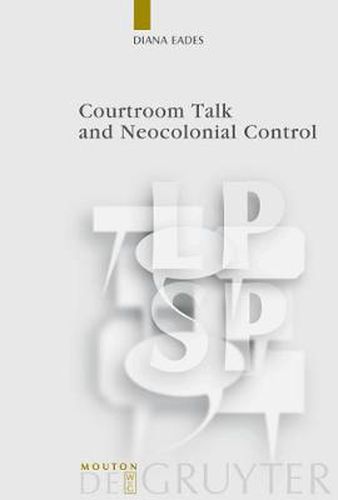Readings Newsletter
Become a Readings Member to make your shopping experience even easier.
Sign in or sign up for free!
You’re not far away from qualifying for FREE standard shipping within Australia
You’ve qualified for FREE standard shipping within Australia
The cart is loading…






This title is printed to order. This book may have been self-published. If so, we cannot guarantee the quality of the content. In the main most books will have gone through the editing process however some may not. We therefore suggest that you be aware of this before ordering this book. If in doubt check either the author or publisher’s details as we are unable to accept any returns unless they are faulty. Please contact us if you have any questions.
The book uses critical sociolinguistic analysis to examine the social consequences of courtroom talk. The focus of the study is the cross-examination of three Australian Aboriginal boys who were prosecution witnesses in the case of six police officers charged with their abduction. The analysis reveals how the language mechanisms allowed by courtroom rules of evidence serve to legitimize neocolonial control over Indigenous people. In the propositions and assertions made in cross-examination, and their adoption by judicial decision-makers, the three boys were constructed not as victims of police abuse, but rather in terms of difference, deviance and delinquency. This identity work addresses fundamental issues concerning what it means to be an Aboriginal young person, as well as constraints about how to perform or live this identity, and the rights to which Aboriginal people can lay claim, while legitimizing police control over their freedom of movement. Understanding this courtroom talk requires analysis of the sociopolitical and historical actions and structures within which the courtroom hearing was embedded. Through this analysis, the interrelatedness of structure, agency, constraint and change, which is central to critical sociolinguistics, becomes apparent. In its investigation of language ideologies that underpin courtroom talk, as well as the details of how language is used, and the social consequences of this talk, the book highlights the need for far-reaching changes to courtroom rules of evidence.
$9.00 standard shipping within Australia
FREE standard shipping within Australia for orders over $100.00
Express & International shipping calculated at checkout
This title is printed to order. This book may have been self-published. If so, we cannot guarantee the quality of the content. In the main most books will have gone through the editing process however some may not. We therefore suggest that you be aware of this before ordering this book. If in doubt check either the author or publisher’s details as we are unable to accept any returns unless they are faulty. Please contact us if you have any questions.
The book uses critical sociolinguistic analysis to examine the social consequences of courtroom talk. The focus of the study is the cross-examination of three Australian Aboriginal boys who were prosecution witnesses in the case of six police officers charged with their abduction. The analysis reveals how the language mechanisms allowed by courtroom rules of evidence serve to legitimize neocolonial control over Indigenous people. In the propositions and assertions made in cross-examination, and their adoption by judicial decision-makers, the three boys were constructed not as victims of police abuse, but rather in terms of difference, deviance and delinquency. This identity work addresses fundamental issues concerning what it means to be an Aboriginal young person, as well as constraints about how to perform or live this identity, and the rights to which Aboriginal people can lay claim, while legitimizing police control over their freedom of movement. Understanding this courtroom talk requires analysis of the sociopolitical and historical actions and structures within which the courtroom hearing was embedded. Through this analysis, the interrelatedness of structure, agency, constraint and change, which is central to critical sociolinguistics, becomes apparent. In its investigation of language ideologies that underpin courtroom talk, as well as the details of how language is used, and the social consequences of this talk, the book highlights the need for far-reaching changes to courtroom rules of evidence.